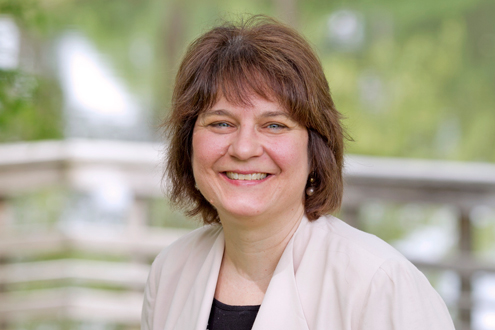
Therese Macan, associate professor of psychology at UMSL, was recently named a fellow in the Society for Industrial and Organizational Psychology. (Photo by August Jennewein)
Therese Macan, associate professor of psychology at the University of Missouri–St. Louis, has been named a fellow in the Society for Industrial and Organizational Psychology for her outstanding and unique research contributions to the field of industrial-organizational psychology. The prestigious honor took place this spring during the annual SIOP Conference in Houston.
“It’s very humbling to be honored by your peers and to have your career accomplishments recognized,” said Macan, a University City, Mo., resident. “When you do what you love and have a passion for it, having others acknowledge that is wonderful.”
Fellow status is awarded to individuals in recognition of outstanding contributions to the field. SIOP is a large international organization of over 8,000 members, with less than 4 percent of the membership gaining fellow status. Even more significant, less than 50 women in the world have received the designation.
Macan, who joined UMSL in 1988, has made outstanding contributions to the field of I-O psychology throughout her career. Her main focus of research has been on employment interviews and time management.
She has extensively researched how interviewers conduct the process and make decisions on applicants, with a special focus on individuals with disabilities and those who are pregnant.
“It is critical that our field keep pace with current legal developments and resulting outcomes for selection of these protected individuals,” Macan said. “My research makes strides in this direction with respect to the employment interview. Despite the Americans with Disabilities Act of 1990, statistics continue to show that qualified applicants with disabilities have higher unemployment rates than applicants without disabilities. What we are seeing is that biases against people with disabilities cannot be erased by government legislation and my work uncovers the underlying processes that may be operating. With this understanding, my findings furnish crucial considerations for human resource practitioners, employers and applicants. For example, the outcomes of my research inform applicants with disabilities under what conditions the disclosures of their disability either before or during the interview and/or discussions of their disability during the interview are effective strategies for improving interviewers’ perceptions and ratings of them as qualified applicants.”
In a similar fashion, she has concentrated on the discrimination of pregnant job seekers.
“Some of my initial work in this area highlights absenteeism and turnover concerns by supervisors and coworkers as a primary factor in their less favorable hiring evaluations of an equally qualified pregnant applicant, issues similar to open legal cases,” she said. “My graduate students and I continue to uncover the underlying processes affecting interviewer decisions and also address strategies job applicants might utilize during the interview to aid in dealing with these interviewer perspectives.”
Macan has written more than 40 articles in peer-reviewed journals, four book chapters in international outlets and made 55 presentations at professional conferences.
But her passion and drive for her field extends beyond research. She recently created a class project to improve the presence of I-O topics on Wikipedia, an online resource. Macan said it can be a helpful site, but because it’s open to anyone to populate, it’s not always accurate and can be lacking in some areas.
Lacking is just what she discovered when looking into the job interview entry. Her students then set out to make a difference and improve what was out there. Macan said the students not only learned important skills such as translating empirical research findings into language understandable by the layperson, but they found ways to advance the knowledge of hiring interviews to the online world. The completed entry features more than 100 resources and offers insight into processes and procedures.














